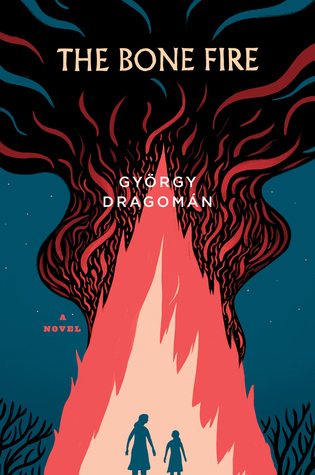Daniel Haeusser reviews short works of SFT that appear both online and in print. He is an Assistant Professor in the Biology Department at Canisius College, where he teaches microbiology and leads student research projects with bacteria and bacteriophage. He’s also an associate blogger with the American Society for Microbiology’s popular Small Things Considered. Daniel reads broadly in English and French, and his book reviews can be found at Reading1000Lives or Skiffy & Fanty. You can also connect with him on Goodreads or Twitter.

“Build a pile of old bones, and burn away the shadows. Because from here on in, the shadows get deeper, the nights get longer. We’re heading into the dark, and we have to hang onto each other. So, we can only carry so much.”
These words, on the etymology of the word bonfire, come from the character Jamie Taylore in the Netflix series The Haunting of Bly Manor, but it nicely summarizes why The Bone Fire is such an apt title for Paul Olchváry’s recent English translation of György Dragomán’s novel Máglya (literally, Bonfire.) If I were to summarize the themes of the novel down to a simple statement, I could do no better than Jamie’s words.
Emma’s parents have died in a car accident, leaving the thirteen-year-old without a family, isolated and mournful within an orphanage. Until one day when an old woman shows up claiming to be the grandmother she didn’t know she still had, the estranged mother of Emma’s mother, come to take Emma home. There, Emma must depart childhood and discover her mature self amid the uncertainties of a new school, a changed political regime, and the mysteries of her family’s past. With Emma to help guide her is only her grandmother, this gentle, secluded figure who radiates mysticism and power, commanding respect even as a local outcast.
Though the novel is set in an unspecified Eastern European country soon falling the Fall of the Iron Curtain, the Hungarian Dragomán has stated that The Bone Fire is set in Transylvania, forming with his novel The White King the first two parts of a trilogy focused on this region of Romania that contains a large Hungarian population. Even if the plot of the novel doesn’t directly relate to political events, the lives and behavior of the characters are inextricably linked to the region and its history, from World War II through the collapse of the Soviet Union.
The Bone Fire opens with a successful revolution and release of Emma from an orphanage prison into freedom with someone who loves her. Things should feel like the start of a whole new season of life, of Spring. And yet… gothic dread and uncertainty continue to hang in the air. Both society on the grand level, and Emma on the personal level, have left the shadows, but are now met with more uncertainty of what the future would hold. Moreover, they haven’t let go of those bones of the past, the trauma and pains they carry. Only by releasing them together can they carry forward through the uncertain season of Winter ahead to then arrive at true growth.
At school and in town, Emma learns of the cruelty of the world, while also seeing some of that cruelty within herself. From her combative grandmother she also begins to learn of strength to overcome such cruelty, of beauty and magic. Gradually, Emma matures into a woman who learns the best of what her grandmother has to offer while also realizing how she can choose a different response to a cruel and unfair past than her grandmother and mother personally formed for themselves.
What little the novel has in terms of active plot is made up for through the richness of its setting, its prose, its characters, its heartbreaking emotion, and the tingle of its magic. It falls within the realms of fantasy or at least magical realism, although I find it interesting that this classification almost completely lies in the Pagan routes of its spiritual core. If the grandmother were less of a witch, and say one more devoted to the rituals and mysteries of Roman Catholicism, would readers still look at any of it as fantasy, or magical?
This is a brilliant novel about self-discovery, a coming-of-age within those shadows of the teen years before the Spring of adulthood. It’s a parallel for the self-discovery of a nation, or a people, formed through many past traumas and facing uncertain future. To make it through requires ritual, a bone fire cleaning of house that acknowledges those lost, the souls and sins of the past, a rite that strengthens the ties between the community of individuals who have survived to hang on to each other even amid failings.
